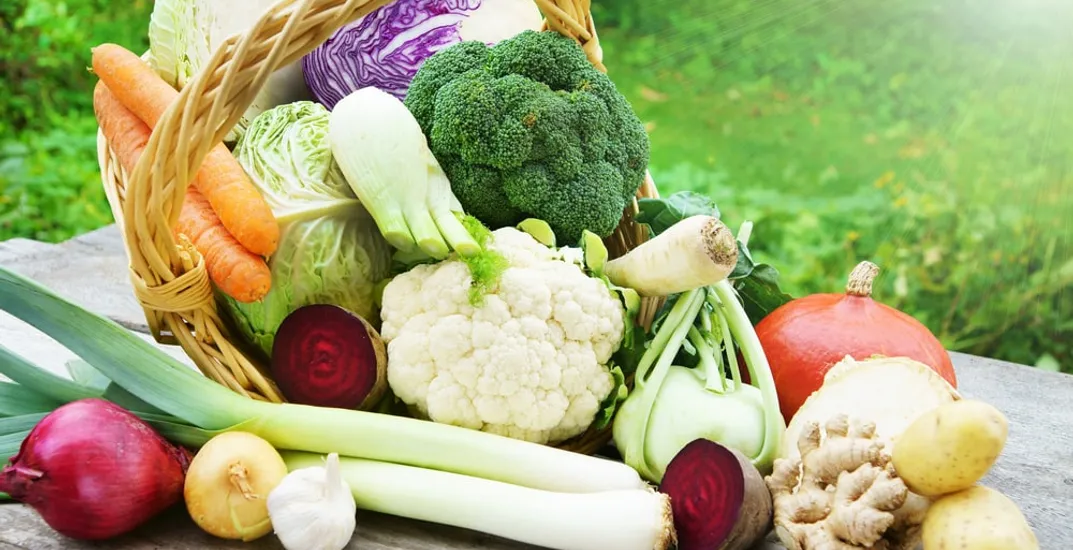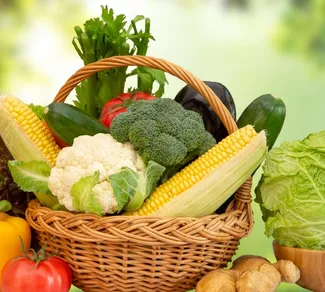Top 10 Winter Vegetables in Pakistan: Benefits, Uses and Much More!
Winter in Pakistan is a season that many eagerly await.
And why not?
There’s something about the cool, crisp air, the sight of foggy mornings, and the comfort of cozying up under a warm blanket with a hot cup of tea.
But what truly makes winter special is the abundance of fresh, seasonal vegetables that flood our markets. After all, these winter vegetables in Pakistan are a true celebration of the season. Packed with flavour and nutrients, they enhance the taste of our meals and contribute to our health and well-being.
So, as you prepare for another delightful winter, let’s look into the top 10 winter vegetables in Pakistan, their nutritional benefits, and how you can enjoy them in your daily meals.
And don’t forget, with Kitchen Hand Online, you can get the freshest vegetables delivered right to your door, making your winter cooking even more enjoyable.
Why Our Climate is Perfect for Growing Winter Vegetables in Pakistan?
Pakistan’s climate is as diverse as its culture, with each region offering unique growing conditions for various crops.
The cooler temperatures and shorter daylight hours during winter create the ideal environment for certain vegetables to thrive. This ensures that we have access to fresh, nutrient-rich produce throughout the season. From the fertile plains of Punjab to the cooler northern regions, winter vegetables in Pakistan are cultivated with care, bringing the best of nature to our tables.
Here’s a quick look at some of the most popular winter vegetables in Pakistan, the benefits they offer, and how we love to enjoy them in our meals.
Top 10 Winter Vegetables in Pakistan
1. Cauliflower (Phool Gobhi)
Cauliflower is a winter staple in Pakistan, known for its versatility in the kitchen.
This veggie is packed with fiber, vitamins C and K, and powerful antioxidants. These nutrients are essential for boosting your immune system, especially during the colder months when we’re more susceptible to colds and flu. Cauliflower is grown extensively in Punjab, where the cool climate enhances its flavour and texture.
In Pakistan, cauliflower is commonly used in curries, where it’s cooked with spices like turmeric, cumin, and coriander to create a hearty dish that pairs well with roti or rice.
It’s also popular in mixed vegetable dishes and can even be battered and fried for a crispy snack. Another favourite is Aloo Gobhi, a simple yet delicious curry made with cauliflower and potatoes.
2. Carrots (Gajar)
Carrots are synonymous with winter in Pakistan.
These vibrant reddish vegetables are rich in beta-carotene, which your body converts into vitamin A—a nutrient essential for good vision, a strong immune system, and healthy skin. Carrots are primarily grown in Punjab’s fertile soils, where they flourish during the winter season.
Moreover, carrots are enjoyed in a variety of ways in Pakistani households
They’re often eaten raw in salads or as a crunchy snack, but they truly shine in traditional dishes like Gajar Matar (carrot and pea curry) and Gajar ka Halwa. The latter is a beloved dessert made by slow-cooking grated carrots with milk, sugar, and ghee, then garnished with nuts. It’s a sweet treat that’s a must-have in winter.
3. Spinach (Palak)
Spinach is one of the most nutritious leafy greens you can add to your winter diet. Rich in iron, calcium, and vitamins A, C, and K, spinach is excellent for maintaining strong bones, boosting your immune system, and improving your energy levels. It’s grown widely across Pakistan, with Punjab and Sindh being major producers.
Spinach is a versatile vegetable in Pakistani cuisine.
It’s often used in Palak Paneer, a creamy curry made with spinach and paneer (a type of fresh cheese). Spinach is also added to lentils to make Palak Dal, a comforting dish that’s perfect for winter.
For a quick and nutritious meal, spinach can be blended into smoothies or added to soups and stews.
4. Radish (Mooli)
Radish is a crisp, peppery root vegetable that adds a refreshing crunch to any dish.
It’s rich in vitamin C, potassium, and fiber, which are great for digestion and overall health. Radishes thrive in the cool climate of Punjab, where they’re widely cultivated during the winter months.
In Pakistan, radishes are often enjoyed in salads, where their crisp texture and spicy flavor can be fully appreciated.
A popular breakfast dish is Mooli Paratha, a stuffed flatbread filled with spiced radish, which is served with yogurt or pickles. Radish is also used in pickling, adding a tangy crunch to meals throughout the year.
5. Turnip (Shaljam)
Turnips are often overlooked, but they’re a powerhouse of nutrition, especially during the winter.
They’re rich in vitamin C, fibre, and potassium, all of which contribute to heart health, digestion, and overall well-being. Turnips are mainly grown in the northern regions of Pakistan, where the cooler climate enhances their natural sweetness.
Turnips are typically cooked in curries in Pakistani cuisine, often paired with meat to create a dish that’s both flavorful and filling.
Shaljam Gosht, a curry made with turnips and mutton, is a winter favourite that’s both warming and nutritious. Turnips can also be roasted with spices for a simple yet delicious side dish.
6. Green Peas (Matar)
Green peas are a sweet and tender winter vegetable that’s loved by many.
They’re packed with protein, fibre, and vitamins like A, C, and K, making them a great addition to any meal. Green peas are cultivated across Pakistan, with Punjab being the largest producer.
In Pakistani cooking, green peas are used in a variety of dishes, from Matar Pulao (rice with peas) to Aloo Matar (potato and pea curry).
These peas add a pop of colour and some sweetness to any dish. They’re also great in soups, stews, and even in salads, providing a nutritious boost to your diet.
7. Beetroot (Chukandar)
Beetroot is known for its deep red colour and earthy flavour but is also packed with nutrients.
It’s rich in folate, manganese, and nitrates, which help improve blood flow and lower blood pressure. Beetroot is grown in various regions of Pakistan, where it’s harvested during the winter months.
Beetroot is incredibly versatile in the kitchen. It can be roasted, boiled, or even eaten raw in salads.
It is often used in traditional dishes like beetroot curry or added to soups for a vibrant and nutritious meal in Pakistan. Beetroot is also a popular ingredient in pickles, adding a tangy flavor to dishes.
8. Fenugreek (Methi)
Fenugreek, or Methi, is a leafy green that’s known for its slightly bitter taste and numerous health benefits.
It’s rich in fibre, iron, and magnesium, making it excellent for digestive health and blood sugar regulation. Fenugreek is grown primarily in Punjab and Sindh during the winter months.
In Pakistani cuisine, fenugreek leaves are used in a variety of dishes, including Methi Aloo (potato and fenugreek curry) and Methi Paratha. The seeds of the fenugreek plant are also used as a spice in many traditional recipes. Fenugreek’s unique flavor adds depth to any dish and makes it a staple in winter cooking.
9. Cabbage (Band Gobhi)
Cabbage is a simple yet nutritious vegetable that’s widely grown in Pakistan during the winter. It’s a great source of vitamin C, vitamin K, and dietary fibre, all of which contribute to a healthy diet. Cabbage is primarily grown in the plains of Punjab, where it thrives in the cool winter climate.
Cabbage is incredibly versatile and can be used in a variety of dishes.
It’s often cooked with spices and other vegetables to create a flavorful curry in Pakistan. Cabbage is also commonly used in salads, stir-fries, and as a filling for wraps and rolls. Its mild flavour and crunchy texture make it a favourite in many households.
10. Broccoli
Broccoli is a relatively new addition to the list of winter vegetables in Pakistan, but it’s quickly gaining popularity for its health benefits.
Broccoli is rich in vitamins C and K, fiber, and antioxidants, all of which are great for boosting immunity and promoting heart health. Although it’s not as widely grown as other winter vegetables, broccoli is increasingly being cultivated in cooler regions of Pakistan.
In the kitchen, broccoli is a versatile vegetable that can be used in a variety of dishes.
It’s often steamed, roasted, or added to salads, soups, and stir-fries. Broccoli’s mild flavour and crunchy texture make it a great addition to any meal, and it’s a perfect way to get a dose of greens during the winter.
Get the winter vegetables in Pakistan from Kitchen Hand Online
Winter vegetables in Pakistan are a true celebration of the season’s bounty. These vegetables bring flavour, nutrition, and warmth to our meals, making them an essential part of our winter diet.
At Kitchen Hand Online, we understand the importance of fresh, quality produce in your kitchen. That’s why we bring you the finest selection of winter vegetables in Pakistan, along with other seasonal vegetables and fruits, sourced from local markets and delivered right to your doorstep.
So, enjoy the convenience of online shopping and savor the taste of winter’s best offerings without any hassle.
Whether you're cooking up a storm or just looking for a healthy snack, Kitchen Hand Online has got you covered with quality vegetables and fruits that are fresh, flavorful, and delivered with care.
about Author
Manzoor Ahmed
My name is Manzoor Ahmed. Please do not call me a foodie, you can call me a Food Lover!
Recent Posts

Healthy Iftar with Fresh Fruits in Ramadan in Pakistan

Ramadan 2025 in Pakistan: Order Fresh Fruits in Lahore

Dry Fruit Price in Lahore: All You Need to Know in 2025



